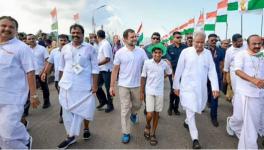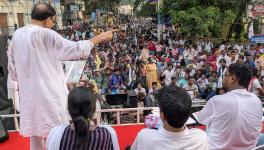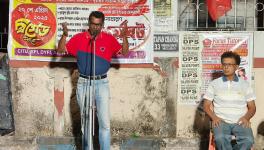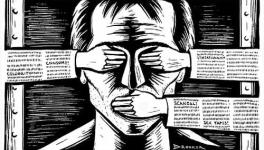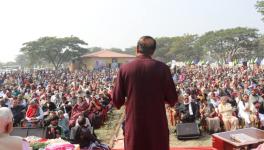Why A Ban on SDPI May Not Help BJP in Karnataka
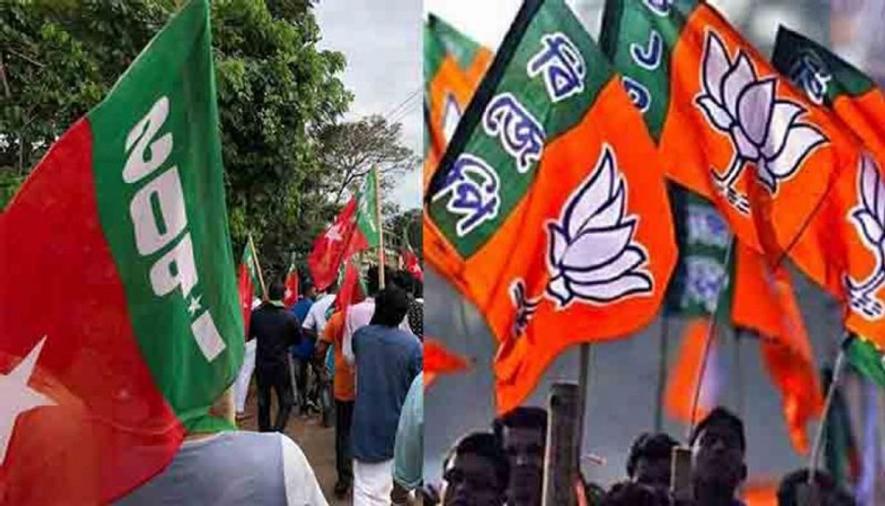
Representational Image. Image Courtesy: Asianet News
Right after the violent incident in Bengaluru on August 11, leaders of the ruling Bharatiya Janata Party (BJP) government in Karnataka repeatedly blamed the Social Democratic Party of India (SDPI) for the entire event. Talking tough, they promised that the state would consider banning the outfit, which is an offshoot of the Popular Front of India or PFI. PFI has gained notoriety in recent years for championing right-wing Islam.
But within a few days, the BJP seems to have abandoned the idea of banning SDPI. Instead, it has started accusing the Congress party and “terrorists” for the violence in Bengaluru. The answer to this shift is not simple political rivalry between the BJP and Congress. It appears evident that the state BJP’s cynical calculation is that its main challenger, the Congress, would be the one to lose more if the Islamist SDPI remains active in Karnataka.
To recap, Bengaluru witnessed unprecedented violence in the vicinity of two police stations earlier this month. The violence was triggered after the police refused to take action against the nephew of a Congress MLA who had allegedly been posting offensive material on social media for two days. The city police have arrested more than 300 people since then, including some SDPI members. SDPI has denied any role in the violence. Yet it has been trying to gain a foothold in Muslim-dominated areas of Karnataka and has in the past demonstrated a simmering ambition in Maharashtra, Uttar Pradesh and West Bengal. In Kerala the SDPI has been caught up in a long series of communal controversies.
On 11 August, a derogatory post on Muhammad, the Prophet of Islam, went viral. A group of Muslim residents went to the police station in the DJ Halli locality demanding the arrest of the alleged perpetrator, P Naveen Kumar. Soon after, the police returned without arresting him. By then, a crowd gathered outside the residence of Naveen’s uncle, Akhanda Srinivas Murthy, the Congress MLA from Pulakeshinagar. The crowd quickly swelled and after the violence the police alleged that many SDPI members were in its midst. The fact remains that if the police had acted swiftly and taken the offender into custody, this issue would not have escalated. Police inaction fuelled unrest, which ultimately escalated to rioting.
The rioting is condemnable and the people responsible must be punished, but what is surprising is the description from several quarters that it was a “planned riot”. How can anybody have hatched a plot in advance when people had demanded police action over the provocative post? The purveyors of this rumour, it has to be said, never refer to the three Muslim men who were killed, allegedly when the police fired at the mob, which needs to be probed as well.
Events aside, there are three primary reasons why the violence in Bengaluru could not be stopped, and these are instructive to administrators, police departments, political leaders, parties and citizens across the country. First, some Congress MLAs did try to douse the anger in Bengaluru, but failed. In this era of competitive communalism, the older generation of Congress leaders who could connect with Muslims has withered away. Muslims in Karnataka revered CK Jaffer Sharief, for instance, but he died in 2018 and the new crop of leaders do not enjoy as much trust and respect among Muslims. The two present Congress legislators, Zameer Ahmed Khan and Rizwan Arshad, tried to subdue tempers but failed, primarily because the party is no longer as deeply connected with people as it once was.
In the current situation, with the BJP deploying every tactic it can to turn this violence into a communally polarising event, a few incidents came in the way of its attempt. One, a video went viral in which Muslim youth had formed a human chain to protect a local temple. If not for such counter-narratives there would be little to challenge the BJP’s communally-driven descriptions of such conflicts with. There were other reports of Muslim youth safeguarding their neighbours homes during the violence. These also helped douse the anger somewhat. But such efforts are largely of local Muslim communities and individuals. What is sorely missing is an active political action, not just in Bengaluru or Karnataka but across the country, to challenge the BJP’s point of view.
This is a leadership vacuum and it can explain to a large extent why the Karnataka government initially talked tough against SDPI and PFI, but then started taking pot-shots at other targets. The state BJP’s cynical realisation is that on the one hand the SDPI can polarise voters along religious lines. On the other hand, the SDPI can split the Muslim vote, not just electorally but socially as well. In both these situations, it is the BJP’s gain. A further inference which the BJP seems to have drawn is that PFI is a political threat to the Congress, and not to itself.
SDPI’s participation in the Assembly and parliamentary elections hardly made a dent in the vote share in Karnataka. In the 2013 Assembly election, it contested from 23 seats and lost badly in 22, getting only 3.2% of total votes. In the 2018 Assembly election, SDPI declared it would contest in 25 constituencies, but ultimately fielded candidates in just three—Chickpet in Bengaluru, Kalaburagi North and Mysore. Muslims make up around 14% of the state population, but it is important to note that the Congress was once the community’s sole electoral choice. And it is only on seats with sizeable Muslim voters that the SDPI fields candidates.
It is in the local municipal elections that the SDPI’s performance has improved. In the 2013 local body elections it won 17 seats, while in 2018, it contested from 80 and won 19 seats. This is a small increase but significant for a fledgeling like SDPI. The growing influence of a hardline brand of politics and its ability to chip away at the Congress’ voters explains why Karnataka Chief Minister BS Yediyurappa has stopped talking about banning SDPI. On the contrary, it appears the state government is justifying taking harsh and unprecedented action against those responsible for the rioting in Bengaluru.
Emulating the Uttar Pradesh model, Yediyurappa has assured that his government would approach the Karnataka High Court and appoint a “claims commissioner” to assess the damage inflicted by the rioters and seek compensation from them. “Our Govt has decided to assess the damages caused to public & private property in the violent incidents in KG Halli & DG Halli & recover the costs from the culprits… Stringent action has been initiated against the culprits of DJ Halli and KG Halli violent incidents including invoking of the Unlawful Activities Prevention Act..” he recently tweeted.
In this way, the BJP wants to kill two birds with one stone. It knows that a ban on SDPI will help the Congress hold on to its Muslim voters. And it knows that the vindictive pursuit of “exemplary” justice in the Bengaluru cases would polarise society. It was evident from the 2019 Lok Sabha polls results that there was a consolidation of majority voters in the state, and SDPI can help it fuel minority consolidation. No matter how insignificant SDPI seems, for all these reasons it is unlikely to be banned by the state government. If it does get banned, the beneficiary will only be the BJP’s biggest rival, the Congress.
Seen from the BJP’s perspective, any gains from an ecosystem that nurtures divisiveness and discord are much bigger than the losses to society as a whole.
The author is a writer and columnist. The views are personal.
Get the latest reports & analysis with people's perspective on Protests, movements & deep analytical videos, discussions of the current affairs in your Telegram app. Subscribe to NewsClick's Telegram channel & get Real-Time updates on stories, as they get published on our website.













